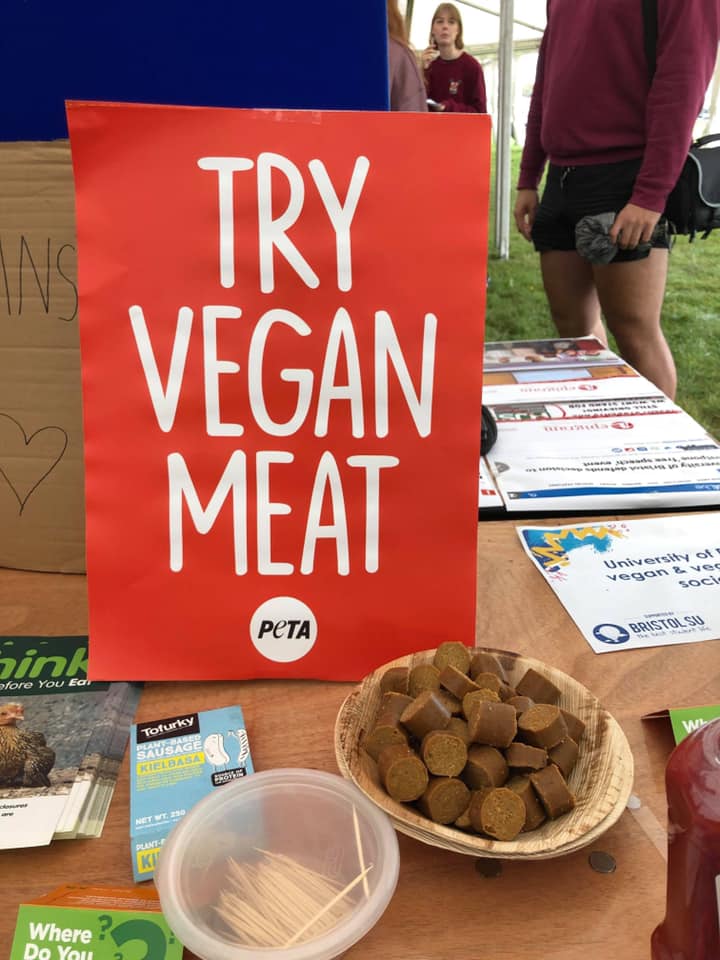By Ellie Brown, News and Features Subeditor
Following the rise of vegetarians and vegans on campus, Epigram has carried out an investigation into the numnber and treatment of animals used in scientific research at Bristol University.
Animal rights awareness and activism seem to be growing on campus. Of the respondents to the SU’s 2018 ‘Food for Thought’ survey, 22 per cent of student's are vegetarian and 11 per cent are vegan – much higher than rates in the wider UK population.
The University’s Vegetarian and Vegan Society (VegSoc) is also remaining popular, with 160 members and an eight-strong committee in the 2019/2020 Academic year so far.
‘Membership levels are definitely increasing all the time’ says the society’s president, Cordelia Hughes, and their discussion group which takes place on Tuesdays at 0800 in the Student Living room is ‘growing weekly’ and currently has ‘20ish regulars.’

Perhaps more striking is the number of students who are part of the society’s activist group, which has 42 members on Facebook.
This requires more involvement from members, who take part in ‘different forms of protest’ around Bristol, including ‘the cube of truth’ in Broadmead. Cordelia describes this as ‘a peaceful street protest where footage of UK farming is shown to the public,’ where protestors ‘engage with those who stop and ask questions about what we are showing.’
Another ‘powerful’ form of activism for the group ‘is to travel out to slaughterhouses around Bristol.’ Here, members ‘bear witness to the animals heading to slaughter,’ ‘take footage of the animals’ and ‘personally connect to the victims [they] are fighting for.’
The group also works to increase awareness of veganism on campus via outreach projects, such as handing out beyond burgers at Hiatt Baker Hall and hosting a ‘ditch dairy’ event with ‘free samples of non-dairy milk, cookies, and leaflets.’
Whether or not as a result of the group’s activities, the University has already made some positive changes. These include the introduction of Meat-Free Mondays to catered halls and the Balloon Bar, which vegans and vegetarians argue will reduce animal suffering; as demand for meat decreases, fewer animals will be raised in cramped farm conditions and have to endure the pain and terror of being sent to the slaughter.
'Members "bear witness to the animals heading to slaughter," "take footage of the animals" and "personally connect to the victims they are fighting for."'
Cordelia Huges, VegSoc President
Other recent improvements include increasing vegan options in food outlets around campus, a new vegan and vegetarian Source café and the introduction of the hedgehog-friendly campus scheme.

Whether these changes have come about as a result of increasing concern for animals or for sustainability, marketing and student satisfaction reasons is hard to tell. In my view, the benefits resulting from these changes seem to matter more than the reasoning behind them.
One area that remains contentious is the use of animals in scientific research. In 2018 alone, 28,308 scientific procedures using animals in research were carried out at the University. According to the website Understanding Animal Research, ten Universities accounted for half of all animal research in 2018, though the University of Bristol was not one of these.
Though the University seems to be committed to reducing the use of animals in its research, holding its first Animal Welfare and Research 3Rs symposium in April 2017, high-impact studies using animals are well-publicised and described as ‘vital to continued progress in medical, veterinary and scientific knowledge in a wide range of areas’ on the University website.
'In 2018 alone, 28,308 scientific procedures using animals in research were carried out at the University'
Ellie Brown
On the use of animals in research, VegSoc is ambivalently saying it is ‘really difficult to judge without strong scientific understanding.’ From a recent talk with a University professor they learned that ‘animal testing here has changed a huge amount over the last 20 years – a lot of progress has been made’ including ‘[reduced] levels of suffering’ both ‘in conditions animals are kept’ and ‘before they are killed.’
Indeed, Dr Nicola Watts, Director of the University’s Animal Services Unit (ASU) states that the animals used by the University in research are ‘normally housed in cages or pens filled with bedding and nesting materials to encourage natural behaviours’ and kept ‘in groups to allow for normal social interaction.’
Happy #TechWeek2020 🥳
— Understanding Animal Research (@animalresearch) February 7, 2020
A big thank you to all the animal technicians that work so hard to look after animals in labs across the world! 🐁🐟🐀🐓🐕🐈🐒🐖🐎🐄 pic.twitter.com/0tODjKK9H5
Yet the Society also ‘represent the opinion that animals are not here for us to use as a commodity.’ Because of this, they ‘demand that the University is constantly challenging the numbers of animals they use’ and keep track of ‘the real scientific progress these experiments are actually making…by constantly questioning this we can drive down the number of animals suffering at our hands.’
However, the extent to which activism can do this is questionable. According to Dr Watts, though alternatives to animal testing have been developed, ‘currently, it is unlikely that these will achieve a wide-scale replacement of the current numbers of animals used in research.’
This is because ‘many aspects of human biology cannot be reproduced in computer models’ and ‘studies in human volunteers also must consider ethical issues and the feasibility of using appropriate non-invasive methods to achieve the scientific objectives.’
'Animals used by the University in research are "normally housed in cages or pens filled with bedding and nesting materials to encourage natural behaviours"'
Dr Nicola Watts, Director of the University’s Animal Services Unit (ASU)
Like other Universities, Bristol’s ‘scientists and technicians who work with animals are committed to the 3Rs’ – replacement, reduction and refining of animal research techniques. These are in UK and EU law and ensure that animals are used only ‘when absolutely necessary [...] to advance our understanding of health and disease.’
Perhaps this is why VegSoc’s activism tends to focus on food and farming, rather than research. If stopping research using animals is unrealistic – and the best that can be hoped for is better laws preventing unnecessary harm or cruelty – then converting students to plant-based diets seems to be a more logical and achievable goal.
Thanks to the climate crisis and concerns over the emissions involved in food production, this may not be as ambitious as it seems.
For Cordelia, ‘if we can agree that hedgehogs should be looked after and that dogs should be loved, we as a society should logically choose to take every type of animal off our plate and learn to thrive on a plant-based diet.’
Featured Image: University of Bristol VegSoc
What are your views on using animals in research? Let us know in the comments!









